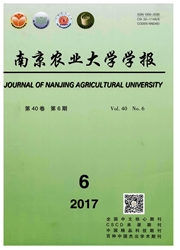

 中文摘要:
中文摘要:
[目的]广谱抗菌剂三氯卡班(TCC)在各种环境介质和生物体中被频繁检出。为了研究TCC对动物的危害,观察了TCC对正常小鼠乳腺上皮细胞(Ep H4-Ev)的急慢性损伤作用,评价其对乳腺上皮细胞的诱癌作用,为防止TCC在动物用品中的滥用提供理论依据。[方法]采用MTT法确定TCC的最佳工作浓度后,作用于Ep H4-Ev细胞,以48 h为1个药物作用循环,分别作用3和6个循环(命名为T3和T6细胞)后,使用MTT法检测细胞增殖,流式细胞术检测细胞内活性氧簇(ROS)水平,Western blot法测定细胞内磷酸化组蛋白(p-H2AX)的蛋白表达量,软琼脂克隆试验检测细胞非停泊性生长能力,细胞划痕试验测定细胞迁移能力,用此指标作为检测TCC引起细胞癌变的指标。[结果]Ep H4-Ev细胞在0.195μmol·L-1TCC作用下,细胞活性最大,故0.195μmol·L-1为TCC的工作浓度;T3和T6细胞的细胞增殖水平、ROS水平、p-H2AX蛋白表达量及软琼脂上的细胞集落个数均显著高于细胞对照;T6细胞的细胞划痕之间的距离显著小于细胞对照。[结论]TCC能够诱导正常的Ep H4-Ev细胞发生癌变。
 英文摘要:
英文摘要:
[ Objectives ] In recent years, the broad-spectrum antimicrobial agent of triclocarban (TCC)was detected frequently in envi- ronment and living bodies. However,the researches of the influence of TCC on human and animal body are still poor. In this study, we investigated the acute and chronic injury effects and cell carcinogenesis of TCC on mice breast cells, and this article provides a theoretical basis to prevent TCC abuse. [ Methods] The effective concentration of TCC to induce breast cells was detected by MTT assay. After that, EpH4-Ev cultures were treated with TCC for 48 h as one cycle, and this treatment was repeated for 3 and 6 cycles, respectively. Then we detected the cell proliferation by MTr method, cellular ROS ( reactive oxygen species) level by fluorescence intensity of DCFH-DA and DNA damage by the expression of p-H2AX, anchorage-independent growth(AIG) by cell clone assay and cell mobility by wound healing test. [ Results ] Our results demonstrated that cell proliferation, cellular ROS level, expression of p-H2AX,number of cell colonies were significantly increased and distance between cells was significantly reduced after cells were persistently exposed to 0.195 μmol. L-1 TCC. [ Conclusions] These results suggested that exposing the EpH4-Ev cells to low dose TCC chronically can induce cellular ROS ascend, cell proliferation increase and the extent of DNA damage aggravation. All of those mean that TCC can induce breast cells carcinogenesis.
 同期刊论文项目
同期刊论文项目
 同项目期刊论文
同项目期刊论文
 期刊信息
期刊信息
